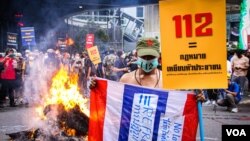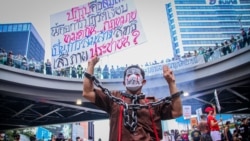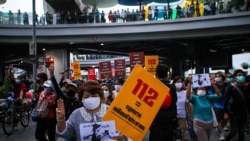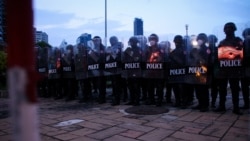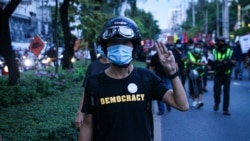Thousands protested in Thailand on Sunday in response to a court ruling that said demands to reform the monarchy were illegal. At least three protesters were injured in clashes with Bangkok police.
The Constitutional Court issued the decision last Wednesday, while also ruling that three anti-government activists -- Arnon Nampa, Panupong Jadnok and Panusaya Sithijirawattanakul – aimed to overthrow the monarchy in speeches made in August 2020.
The activists had listed 10 demands calling for reform of the royal institution, as well as the abolition of Article 112, known as lese-majeste, that criminalizes criticism of the monarchy. The charge carries a punishment of up to 15 years in prison.
Kan Sangtong is an observer working for iLaw, a Thailand human rights organization. He told VOA that protests were expected following the court's decision on reforming the royal institution.
“The ruling of the Constitutional Court makes the mobs very angry. They try to reform the 112 criminal act,” Kan Sangtong said.
Opposition groups had planned for street rallies to begin at Bangkok’s Democracy Monument and end at Sanam Luang, where the Grand Palace is located. A heavy police presence and large roadblocks made up of shipping containers deterred the anti-government groups, which then relocated to the Pathumwan Intersection.
Demonstrators soon gathered and burned effigies of Constitution Court judges before marching in the direction of Germany's embassy in Bangkok to submit a statement.
Thailand King Maha Vajiralongkorn is a regular visitor to Germany and reports say he has recently returned to the European country. Protesters marched to the Germany embassy about a year ago to urge Germany to look into whether the monarch was managing Thailand’s state affairs from there. Pro-reform activists have voiced concerns that Thailand could return to being an absolute monarchy.
Thailand was an absolute monarchy for centuries until the system ended in 1932. Since then, Thailand has been a constitutional monarchy. Today, it has a democratic form of government, but with the monarch as the head of state. In recent years, the country has seen military coups, with the last one happening in 2014.
Pravit Rojanaphruk, a veteran journalist who works for Thailand news website Khaosod English, told VOA about the complaints activists have against the current system.
“Protesters [are] perceived as anti-monarchists after the Constitutional Court’s ruling, while demonstrators themselves allege there exists a scheme to return Thailand to de factor absolute monarchy system.”
Demonstrators have argued reforms do not mean the abolition of the monarchy. Many activists were seen holding signs of “No absolute monarchy” on Sunday.
One Thai protester, who didn't want to share his name because he feared for his safety, told VOA at the rally: “We need to change the constitutional law. The rule of law for Thailand needs to be changed. We want to draft a new law, a new constitution; we need a new one that is for the people!”
As rows of riot police stood behind shields near Bangkok’s Siam Paragon shopping mall in efforts to block the movements of protesters, small confrontations began, with demonstrators kicking makeshift roadblocks to the ground.
When protesters pushed forward, police fired rubber bullets and tear gas as they retreated into a nearby police hospital, local media reported.
At the scene, VOA witnessed one male protester with a wound to the chest. On-site medics treated him quickly and he was taken to a hospital by ambulance.
Hundreds of protesters managed to break away and continue their march to the German embassy, followed by waves of demonstrators on motorcycles. Three representatives were eventually allowed to submit their statements to embassy officials. The rally ended shortly before 7 p.m. local time.
Sean Boonpracong, a national security adviser for the government from 2011 to 2014, said he was surprised by the lack of numbers on the street, saying an estimated 2,000 people were in attendance. He told VOA shifting priorities among Thais may be affecting turnout.
“It doesn’t get the traction as it should. It should be a whole lot more. I expected today to be 20,000 minimum, but it means the people are more pre-occupied with making a living during COVID19,” he said.
But Pitch Pongsawat, an associate dean of faculty of political science at Bangkok’s Chulalongkorn University, told VOA that the movement shouldn’t be solely judged just on offline demonstrations.
“I think it’s simmering; the world is connected. The base is expanding. The new generation really has its own world. We cannot evaluate the struggle purely with offline protests. The online world is like the jungle. People are very brave to criticize,” he added.
Pitch Pongsawat, the associate dean at Chulalongkorn University, said he expected a different approach from authorities following Wednesday’s ruling.
“I thought they were going to let people protest today, record everything and charge them later,” he said. “But instead, they drew a lot of policemen on the street. My confusion is that they could have just used the legal weapon to deal with it. It seems to me they are doing the full-scale suppression.”
The anti-government and reform protests erupted in August 2020, demanding a reduction in the powers of the monarchy. Activist groups have also demanded the resignation of Prime Minister Prayuth Chan-o-cha, more recently over the handling of the coronavirus pandemic. He refuses to step down.
In April, cases quickly surged, leading to widespread restrictions and curfews. The pandemic has led to millions of job losses, and many locals struggling to survive. Approximately 58% of Thailand’s population are vaccinated.
Thailand recently reopened its borders to vaccinated visitors from more than 60 countries without the need for quarantine. The reopening is to help boost tourism, a crucial component of the country's overall economy.




